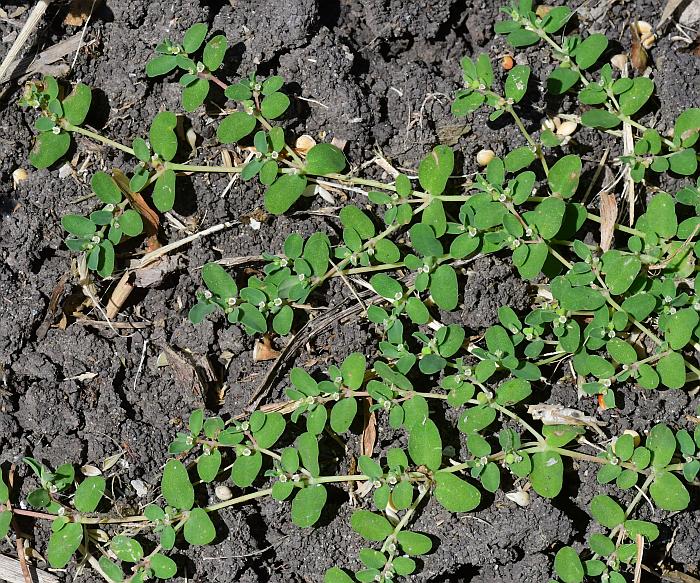Euphorbia serpens Kunth
Round-leaved Spurge

Native
CC = 4
CW = 0
MOC = 37
© SRTurner
Euphorbia serpens KunthRound-leaved Spurge | |
 |
Native CC = 4 CW = 0 MOC = 37 |
© SRTurner |
|
Family - Euphorbiaceae Habit - Taprooted annual forb, forming mats. Stems - Prostrate, to 30 cm, several-to many-branched, the branches often overlapping (plants mat-forming), tan to yellowish green, sometimes slightly pinkish-tinged, glabrous.
Leaves - Opposite, simple, sessile to very short-petiolate. Stipules small scales 0.7-1.3 mm long, those from the adjacent leaves in each pair fused into a single, small, scalelike structure on each side of the stem positioned between the leaf bases, this often appearing irregularly fringed or lobed. Leaf blades 2-8 mm long, oblong-ovate to nearly circular, asymmetrically rounded to shallowly cordate at the base with the side toward the branch base usually slightly expanded into a small, rounded auricle, rounded at the tip, the margins entire, both surfaces glabrous, the upper surface usually light green to yellowish green, the undersurface usually pale grayish green.
Inflorescences - Axillary, of solitary cyathia or appearing as small clusters on short axillary branches.
Cyathia - Involucre 0.7-1.0 mm long, glabrous, the rim shallowly 4-lobed or 4-toothed, the marginal glands 4, 0.3-0.6 mm long and roughly equal in size, the body oblong to narrowly oblong, yellowish green to green, with a relatively inconspicuous petaloid appendage 0.3-0.7 mm long, this white to somewhat pinkish-tinged. Staminate flowers 3-8 per cyathium. Ovaries glabrous, the styles 0.2-0.4 mm long, each divided 1/8-1/2 of the way from the tip into 2 slightly club-shaped lobes.
Fruits - Schizocarps 1.0-1.5 mm long, 3-lobed, glabrous, dehiscent. Seeds 0.9-1.2 mm long, oblong-ovate to ovate in outline, bluntly angular in cross-section, slightly convex at the base, the surface smooth, white to brown, lacking a caruncle.
Flowering - May - October. Habitat - Streambanks, pond margins, sloughs, oxbows, ditches, crop field margins, roadsides, open disturbed areas. Origin - Native to the U.S. Lookalikes - Other members of the Chamaesyce group within the Euphorbia genus, most particularly E. geyeri. Other info. - This inconspicuous mat-forming plant is scattered in Missouri, found mainly in counties bordering the major rivers and in several western counties. Beyond Missouri its native range occupies a broad band within the central part of the continental U.S. It is considerably less common than some other members of the Chamaesyce group. The plant is recognized by its prostrate habit, completely glabrous herbage, and fused, fringed stipules at each leaf node. This last feature distinguises it from its closest lookalike, E. geyeri, which has free stipules at each leaf base. The plant is also characterized by having smaller, broader leaves than most other members of the group. Photographs taken at Marais Temps Clair Conservation Area, St. Charles County, MO, 8-6-2020 and 9-1-2022 (SRTurner). |